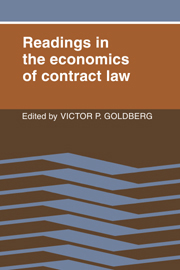Book contents
- Frontmatter
- Contents
- Preface
- Readings in the economics of contract law
- Part I Some preliminaries
- Part II Contract law and the least cost avoider
- Part III The expectation interest, the reliance interest, and consequential damages
- Part IV The lost-volume seller puzzle
- Part V Specific performance and the cost of completion
- Part VI Power, governance, and the penalty clause puzzle
- Part VII Standard forms and warranties
- 7.1 Institutional change and the quasi-invisible hand
- 7.2 A theory of the consumer product warranty
- Questions and notes on warranties
- Part VIII Duress, preexisting duty, and good faith modification
- Part IX Impossibility, related doctrines, and price adjustment
- Questions and notes on impossibility and price adjustment
- References
- Index of cases
- Author index
- Subject index
Questions and notes on warranties
Published online by Cambridge University Press: 10 November 2010
- Frontmatter
- Contents
- Preface
- Readings in the economics of contract law
- Part I Some preliminaries
- Part II Contract law and the least cost avoider
- Part III The expectation interest, the reliance interest, and consequential damages
- Part IV The lost-volume seller puzzle
- Part V Specific performance and the cost of completion
- Part VI Power, governance, and the penalty clause puzzle
- Part VII Standard forms and warranties
- 7.1 Institutional change and the quasi-invisible hand
- 7.2 A theory of the consumer product warranty
- Questions and notes on warranties
- Part VIII Duress, preexisting duty, and good faith modification
- Part IX Impossibility, related doctrines, and price adjustment
- Questions and notes on impossibility and price adjustment
- References
- Index of cases
- Author index
- Subject index
Summary
1. Farmers often buy their seeds from seed companies. Sometimes the seeds are defective (they carry disease, they include weeds, they are an inferior variety, and so on) and the net result is a disappointingly small crop. The farmer's loss would be disproportionate to the price of seeds, since if the seeds are bad his expenses on other inputs (labor, land, irrigation, and so forth) are all for nought. Seed companies usually include limitations on liability in their contracts (or on their packages and in their catalogues). Typically, liability is limited to the purchase price of the seeds.
Such disclaimers do not fare well in the courts. Some courts have found the disclaimers unconscionable for a variety of reasons: (a) all the competitors' using a similar clause, (b) the farmers have relatively little bargaining power, (c) farmers are uncounseled laymen, (d) the fact that the defect is usually within the control of the seed company, which is in a better position to prevent the defect, and (e) the fact that the farmer could lose his entire livelihood while the seed company would lose only a relatively few dollars. (See, for example, Martin v. Joseph Harris Co., Inc.)
- Type
- Chapter
- Information
- Readings in the Economics of Contract Law , pp. 185 - 186Publisher: Cambridge University PressPrint publication year: 1982



